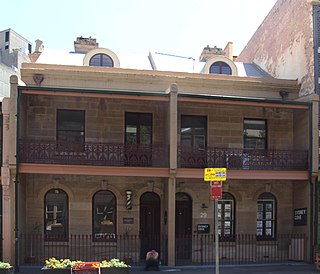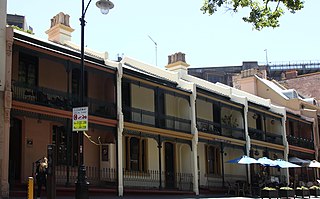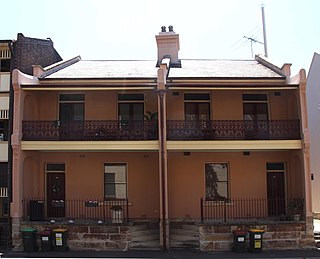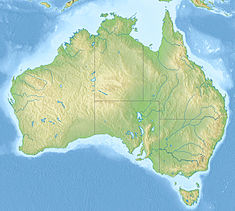
The Central Local Court House or Police Law Courts or Central Police Court is a heritage-listed building located at 98 Liverpool Street, in the central business district of Sydney, New South Wales in Australia. Constructed in the Federation Free Classical style based on original designs by Colonial Architect, James Barnet, the building structure was completed in 1892 under the supervision of Barnet's successor, Government Architect, Walter Liberty Vernon. It is also known as Sydney Central Local Court House, Police Law Courts and Central Police Court. The property is owned by the Department of Justice, a department of the Government of New South Wales. It was added to the New South Wales State Heritage Register on 2 April 1999. The court house is located in a precinct that includes the Downing Centre, and buildings housing the Family Court of Australia and the Federal Circuit Court in Sydney. Adjacent to the court house is Brickfield Place, a brick paved courtyard with seating and planter boxes, constructed in 1892, assessed as a good example of urban design for public open space.

The North Sydney Post Office is a heritage-listed post office located at 92-94 Pacific Highway, North Sydney, North Sydney Council, New South Wales, Australia. It was designed by the Colonial Architect’s Office under the direction of James Barnet, and built from 1885 to 1889 by James Reynolds. The property is owned by Australia Post, an agency of the Australian Government. It was added to the New South Wales State Heritage Register on 22 December 2000.

Playfair's Terrace are heritage-listed terrace houses located at 1–7 Atherden Street in the inner-city Sydney suburb of The Rocks in the City of Sydney local government area of New South Wales, Australia. It was built in 1880. It is also known as Playfairs. The property is owned by Property NSW, an agency of the Government of New South Wales. It was added to the New South Wales State Heritage Register on 10 May 2002.

The Metcalfe Bond Stores is a heritage-listed former bond store and warehouse and now shops and offices located at 68–84 George Street in the inner city Sydney suburb of The Rocks in the City of Sydney local government area of New South Wales, Australia. It was built from 1912 to 1916. It is also known as New Metcalfe Bond Stores. The property is owned by Property NSW, an agency of the Government of New South Wales. It was added to the New South Wales State Heritage Register on 10 May 2002.

29–31 George Street are two heritage-listed former terrace houses and now offices located at 29–31 George Street in the inner city Sydney suburb of The Rocks in the City of Sydney local government area of New South Wales, Australia. It was built in 1866. The property is owned by Property NSW, an agency of the Government of New South Wales. It was added to the New South Wales State Heritage Register on 10 May 2002.

The Sergeant Major's Row are heritage-listed former terrace houses and now shops and offices. They are located in a row at 33–41 George Street in the inner city Sydney suburb of The Rocks in the City of Sydney local government area of New South Wales, Australia. The row was built in 1881. It is also known as Sergeant Majors Row (terrace) and Major's. The property is owned by Property NSW, an agency of the Government of New South Wales. It was added to the New South Wales State Heritage Register on 10 May 2002.

The Old Police Station, The Rocks is a heritage-listed former police station and now home to Sergeant Lok, a Modern Asian restaurant and bar, that is located at 127–129 George Street in the inner city Sydney suburb of The Rocks in the City of Sydney local government area of New South Wales, Australia. It was designed by James Barnet and built in 1882 by W. Cains and Sons. The property is owned by Property NSW, an agency of the Government of New South Wales. It was added to the New South Wales State Heritage Register on 10 May 2002.

The Model Factory and Dwelling is a heritage-listed former factory, store and dwelling and now offices located at 120 Gloucester Street in the inner city Sydney suburb of The Rocks in the City of Sydney local government area of New South Wales, Australia. It was designed by George McRae and built from 1912 to 1913. It is also known as Chung Lun Building and (erroneously) the Housing Board Building. The property is owned by Property NSW, an agency of the Government of New South Wales. It was added to the New South Wales State Heritage Register on 10 May 2002.

95-99 George Street, The Rocks are heritage-listed shops and cafe and former dwellings located at 95-99 George Street in the inner city Sydney suburb of The Rocks in the City of Sydney local government area of New South Wales, Australia. It was built from 1868 to 1868. The property is owned by Property NSW, an agency of the Government of New South Wales. It was added to the New South Wales State Heritage Register on 10 May 2002.

Jobbins Terrace is a series of heritage-listed terrace houses now repurposed as residences and offices located at 103–111 Gloucester Street, in the inner city Sydney suburb of The Rocks in the City of Sydney local government area of New South Wales, Australia. It was built from 1855 to 1857. It is also known as Longs Lane Terraces/Precinct . The property is owned by Property NSW, an agency of the Government of New South Wales. It was added to the New South Wales State Heritage Register on 10 May 2002.

The Long's Lane Precinct, also Longs Lane Precinct, comprise a series of heritage-listed terrace houses located at 130 Cumberland Street, 132–134 Cumberland Street, 136-138 Cumberland Street, and 140–142 Cumberland Street, in the inner-city Sydney suburb of The Rocks in the City of Sydney local government area of New South Wales, Australia. The terrace houses were built from 1888 to 1914, and they are also known as 130 Cumberland Street,132–134 Cumberland Street, 136–138 Cumberland Street, Watson's Butchery, and 140–142 Cumberland Street. The properties are owned by NashCap, an Australian-based real estate private equity firm. The precinct and the terrace houses were added to the New South Wales State Heritage Register on 10 May 2002.

113–115 Gloucester Street, The Rocks is a heritage-listed terrace house located in the Long's Lane Precinct at 113–115 Gloucester Street, in the inner city Sydney suburb of The Rocks in the City of Sydney local government area of New South Wales, Australia. It was built during 1881. It is also known as Longs Lane Terraces/Precinct. The property is owned by Property NSW, an agency of the Government of New South Wales. It was added to the New South Wales State Heritage Register on 10 May 2002.

117–117a Gloucester Street, The Rocks is a heritage-listed terrace houses located in the Long's Lane Precinct at 117–117a Gloucester Street, in the inner city Sydney suburb of The Rocks in the City of Sydney local government area of New South Wales, Australia. It was designed by W. Foggitt and built from 1912 to 1915. It is also known as Longs Lane Terraces/Precinct (Long's). The property is owned by Property NSW, an agency of the Government of New South Wales. It was added to the New South Wales State Heritage Register on 10 May 2002.

The Old Coroner's Court, The Rocks are heritage-listed shops and the site of the former The Rocks Visitors Centre, a former morgue, the former Coroner's Court of New South Wales and offices located at 102–104 George Street, in the inner city Sydney suburb of The Rocks in the City of Sydney local government area of New South Wales, Australia. It was designed by Walter Liberty Vernon and built from 1906 to 1908. It is also known as Coroner's Court (former) - Shops & offices, Coroners Court / City Morgue and shops and offices. The property is owned by Property NSW, an agency of the Government of New South Wales. It was added to the New South Wales State Heritage Register on 10 May 2002.

The View Terrace facades are heritage-listed offices and a former residence and terrace houses located at 26–30 Gloucester Street, in the inner city Sydney suburb of The Rocks in the City of Sydney local government area of New South Wales, Australia. It was built from 1893 to 1893. It is also known as Formerly 22–30 Gloucester Street and part of 40 Gloucester Street development. The property is owned by Property NSW, an agency of the Government of New South Wales. It was added to the New South Wales State Heritage Register on 10 May 2002.

32–36 and 38–40 Gloucester Street facades, The Rocks is a heritage-listed former residence located at 32-36 and 38-40 Gloucester Street, in the inner city Sydney suburb of The Rocks in the City of Sydney local government area of New South Wales, Australia. It was built during 1885. It is also known as part of development known as 40 Gloucester Street. The property is owned by Property NSW, an agency of the Government of New South Wales. It was added to the New South Wales State Heritage Register on 10 May 2002.

Blyth Terrace is a heritage-listed series of terrace houses located at 82–88 Kent Street, in the inner city Sydney suburb of Millers Point in the City of Sydney local government area of New South Wales, Australia. It is also known as AMA House. The property was added to the New South Wales State Heritage Register on 2 April 1999.

Linsley Terrace is a series of heritage-listed terrace houses located at 25–35 Lower Fort Street, in the inner city Sydney suburb of Millers Point in the City of Sydney local government area of New South Wales, Australia. It was built from 1830. It is also known as Major House. The property was added to the New South Wales State Heritage Register on 2 April 1999.

21–23 Lower Fort Street, Millers Point are heritage-listed terrace houses located at 21–23 Lower Fort Street, in the inner city Sydney suburb of Millers Point in the City of Sydney local government area of New South Wales, Australia. It was built from 1832. It is also known as Nicholson's Houses. The property was added to the New South Wales State Heritage Register on 2 April 1999.

History House, Sydney is a heritage-listed former residence, doctor's rooms and clubhouse and now historical society located at 133 Macquarie Street in the Sydney central business district, in the City of Sydney local government area of New South Wales, Australia. It was designed by George Allen Mansfield and built from 1853 to 1872. It is also known as Wickham House. The property is owned by the Royal Australian Historical Society. It was added to the New South Wales State Heritage Register on 2 April 1999.






















